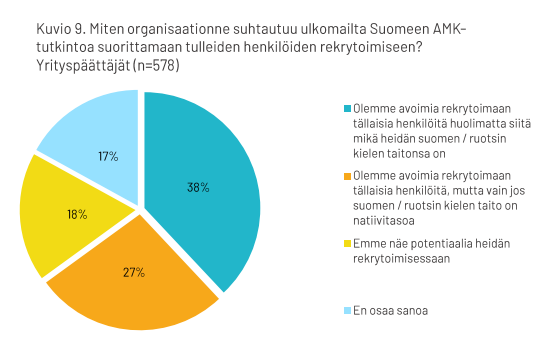Samuli Maxenius, Asiantuntija, ARENE.
In the coming years, universities of applied sciences will play a significant role in promoting social diversity and educational equality. Raising the level of education of citizens, demographic development and increasing education-based immigration will increase the number of immigrants and students with an immigrant background in universities of applied sciences. The framework is necessary, because in Finland the level of education of persons with foreign background is still significantly lower than that of the native population. It is therefore important to invest in polytechnic education in order to support the social rise of young people with a foreign background and thus social integrity and equality in education.
An evaluation carried out by the NationalCentre for The Evaluation of Education in 2019 showed that although the number of students with foreign background in Finnish higher education institutions has grown in recent decades, they are still an underrepresented group in higher education. The majority of immigrant students and students with an immigrant background study at universities of applied sciences.
As a result of the demographic development in Finland, the share of people with an immigrant background in younger age groups will grow and the amount of education-based immigration will increase. Together, these factors will increase the number of students with foreign background in higher education institutions. Universities of applied sciences will play a significant role in educating students, especially those with an immigrant background, as the strong duality of upper secondary education has guided young people with an immigrant background into vocational education and training. Universities of applied sciences are the most natural place for this group to complete a university degree. It is also important to develop the admission channels of universities of applied sciences to support people from different backgrounds applying for higher education studies.
Universities of applied sciences are already central hubs of multiculturalism in many areas, where students from different cultural backgrounds meet. Especially in many smaller university of applied sciences localities, the most significant community of foreigners in the region is precisely the students of the polytechnic. A key challenge for universities of applied sciences is to create models that support the communality of student groups and practices that support the transition of students with a foreign background to working life. According to a survey conducted by Arene in the spring of 2020, a significant number of employers were not at all interested in hiring graduating foreign students, regardless of their language skills. It is plausible that the same setof positions will also affect the employment of Finns with an immigrant background in expert positions.

Source: "School of Working Life" – Universities of Applied Sciences in Finland, Arene ry 2021
In addition to training students with a foreign background for expert and supervisory positions, universities of applied sciences play a significant role in increasing the understanding of the attitudes of the native population towards multiculturalism. In a multicultural university of applied sciences, students learn to work with people from different backgrounds, and the aim must be that cooperation and understanding of others is also reflected later in working life and, more generally, in societalattitudes.
It is particularly important for the integrity, equality and competitiveness of Finnish society that we bring young people with a foreign background into our higher education system. Education is a key tool for promoting social mobility, and education is also cumulative in the educational choices and social integration of future generations.
Airas et al. Background matters – Students with foreign background on the higher education path, National Centre for Educational Assessment 22:2019. https://karvi.fi/wp-content/uploads/2019/11/KARVI_2219.pdf
“School of Working Life” – Universities of Applied Sciences in Finland, Arene ry 2021. https://www.arene.fi/wp-content/uploads/Raportit/2021/Ty%C3%B6el%C3%A4m%C3%A4n%20korkeakoulu%202021%20raportti%20v2.pdf?_t=1616063937